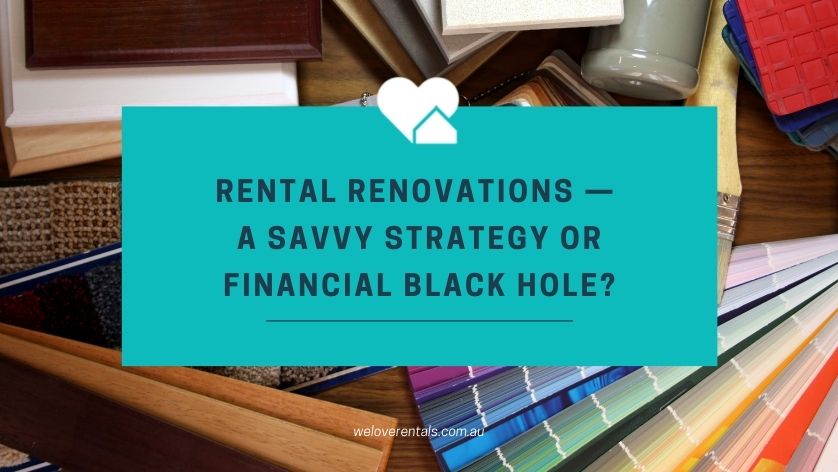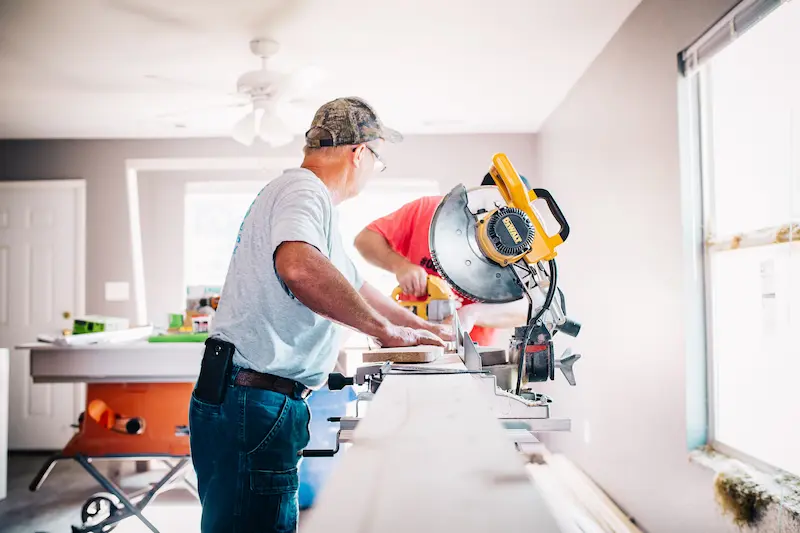
Rental renovations — a savvy strategy or financial black hole?
Some landlords treat their rental property purely as an investment, guarding their bottom-line fiercely. They don’t spend a cent on rental renovations unless they need to.
Others are enthusiastic about improvements for various reasons, including:
● Improving rents / resale value
● Retaining / attracting quality tenants
● Preventing deterioration
● Compliance / safety
● Tax-deductibility.
Both approaches can be justifiable, depending on circumstances. This blog is to help you understand approach is right for you based on your goals for the property.
Should I make improvements to my rental property?

Before planning upgrades to your investment property, we recommend considering these questions:
1. Is work legally necessary? For example, fixing a faulty pool-gate, installing smoke alarms or RCDs.
This is a no-brainer! To avoid substantial penalties, don’t delay, get it done.
2. Will it reduce risk? For example, rewiring, securing heavy furniture or replacing frayed carpet.
Some landlords don’t rectify potential safety issues unless legally or urgently required to. For example, keeping blinds that don’t meet current standards until they are a write-off. But where there’s risk, it’s smart to be proactive. Why? Because you have a common-law “duty of care” to tenants. If your property is unsafe, and someone suffers harm, you’re liable.
So do the work!
What other rental property renovations should I consider?
Assuming your rental property is safe and compliant, should you spend money on further improvements? When deciding, ask yourself:
1. Will this outlay save money long-term?
Delaying maintenance can be short-sighted. For example, replacing a cracked roof-tile isn’t expensive – future potential property damage if it’s not dealt with can be far more costly. Experts suggest budgeting 1% of property value p.a. for maintenance.
2. Will rent increase enough to justify costs?
This can’t be predicted exactly, but We Love Rentals can advise what additional rent any planned improvements may bring. Prospective tenants (or anyone viewing your property) can also be asked “What rent would you pay if we installed X?” Whether potential rent increases justify upgrades, depends on circumstances – for example, estimated costs, your tax situation, and projected rent losses while work is done.
3. Will I recoup costs when selling?
This is hard to assess. Be cautious, and seek advice. Experts agree that even a well-maintained kitchen in your own home won’t necessarily recoup what it cost, when selling. Remember, renovations depreciate. But if in the meantime it gives you higher-paying, higher-quality tenants, it can be worth it. It’s important to note that some property improvements like bathroom renovations can be claimed as tax deductions if they generally further rental income producing ability. Always speak to your accountant or financial advisor for specifics you can claim via a depreciation schedule.
4. Can I let this property as-is?
We Love Rentals can give an expert opinion on whether a property is lettable as-is. If it’s already competitive with comparable rentals nearby, we’ll advise you to save your money.
Which upgrades give the most “bang for your buck” for rental properties?
The following recommendations are based on feedback from seasoned investors, and experienced property managers at We Love Rentals.
Top 10 Cost-effective Upgrades
INDOORS
1. Paintwork – A fresh coat of paint in light, neutral colours is inexpensive, and makes a property appear cleaner, larger and lighter.
2. Floorcoverings – Laminate flooring or hard-wearing carpet can be laid at moderate cost, and give interiors a huge lift.
3. Windows – Replacing old-fashioned window coverings, even with low-budget blinds, improves aesthetics and safety. Functional fly-screens are essential here in Perth!
4. Air-conditioning – Many WA tenants consider air-conditioning a necessity. It doesn’t need to be ducted.
5. Kitchens – A full renovation is rarely justified, but a ‘freshen-up’ can be worthwhile. Painting cupboards/tiles gives an inexpensive facelift. A dishwasher is a ‘must-have’ for many.
6. Bathrooms – Cost-effective strategies to refresh bathrooms include: painting tiles/cupboards, replacing shower-curtains/fixtures, resealing tiles/grout.
7. Storage – Tenants love storage – shelving, cupboards, and built-ins all add value.

Repainting in is inexpensive, and makes a property appear cleaner, larger and lighter.
OUTDOORS
8. Fencing/Security – Family homes have broader appeal if at least the rear garden is enclosed so that children and pets are secure. Depending on the area/type of property, security cameras, alarms, and lockable gates may be desirable.
9. Parking – Tenants like off-street parking. A car park bay or carport can also add value for resale.
10. Maintenance – Make gardens tidy and low-maintenance – garden landscaping such as mulch beds, plant shrubs rather than flowers, and use hardy grasses/plants. Never install a pool (a maintenance nightmare!) but creating a simple paved outdoor-living space can be worthwhile.

Outdoor maintenance can be just as important as indoor when it comes to rental value.
What’s the bottom line?
We recommend always getting expert, local advice, to avoid overcapitalising. While there are many more ways that home extensions can increase your property value , keep calm, invest strategically and don’t get carried away!
For advice on making your property safe and welcoming, without wasting a cent on investment property renovations, contact us today at We Love Rentals, on 6254 6313.
We’re here to help!

